Here’s what I’m most looking forward to.
By Judith Ruskay Rabinor
As published on February 13, 2023 in The Ethel, a publication of AARP
Eighty! Oh no! I felt crazed as I inched toward my 80th birthday last October. A cacophony of colliding emotions rattled my brain. I was no longer getting older — I had arrived.
Yes, I knew I was privileged, with a healthy husband and grown children who were flourishing, as were their families. My professional work still engaged and inspired me. If, as Sigmund Freud said, work and love are the cornerstones of well-being, then I had a solid foundation going into my ninth decade. Also, reaching 80 in good health is a gift not granted to everyone. I knew that well, having lost loved ones and friends. I had much to be grateful for.
Nonetheless, during the months leading up to my 80th birthday, my emotions wavered wildly. As I was entering the “elderly” category, I hated thinking about frail bones and giving up driving at night. I hated owning my declining strength. The words of the poet Dylan Thomas echoed in my head, “Rage, rage at the dying of the light.”
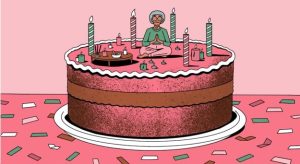
So, I did what I’ve done throughout my life when facing transitions and dread. I wrote.
My Facebook page became my journal. I poured out my heart. Once again, I found that sharing my woes expanded my world. “Me, too!” wrote back family friends and strangers. The validation delighted me.
When the week before the big day arrived, I was amazed: Feelings of enthusiasm had mingled in with my dread. How thrilling to be honored with a gala party for 50 hosted by my children. The following week I went out to dinner with five of my high school friends, including one woman I had rollicked with in the playpen. Now I’m looking forward to attending my 60th high school reunion with, yup, my 80-year-old peers.
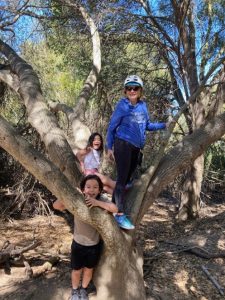
Never too old to climb a tree! Judy pictured with her grandchildren.
Perhaps these gatherings were responsible for buoying my spirits. Perhaps it was the writing that allowed me to dip into my dark feelings and access not only my fears, but my joy. Perhaps it was that I had recently taught two close friends to play pickleball and was on the court several times a week. Or maybe the sunshine offered magical powers. Regardless, what was real for me was feeling invigorated. And going forward, I anticipate bringing more joy into my life. Here’s how.
- People
I’m a people person, and in fact, love does make my world go round. Recently I’ve been repeating what is believed to be a Swedish proverb: “Joy shared, twice the gain; sorrow shared, half the pain.” My supportive network of family and friends makes my heart sing. Now is my time to invest in love. Each time a grandchild reads me a poem or asks me a complicated question, I am transported back to my youth. “Would you want to live even if you are in a wheelchair?” asked my 10-year-old grandson Nat. “Do you believe in God?” asks his 16-year-old brother, Sam. Young minds excite and enliven me.
Research indicates that little acts of kindness lower our blood pressure and increase our self-esteem. I expect I’ll spend more time supporting friends who are ill and/or grieving. Having time to prioritize kindness is precious, and having compassion for others increases our own self-compassion, too.
- Work
My professional identity has been as a clinical psychologist. Now I see fewer clients and enjoy doing more consulting and teaching and writing. I might even have another book in me!
- Play
Sigmund Freud targeted work and love as the pillars of well-being, but he omitted an essential ingredient: play. In the words of George Bernard Shaw, “We don’t stop playing because we grow old; we grow old because we stop playing.” Making time for play and movement revitalizes wellness on all fronts — mind, body and spirit. I’m lucky to still be able to play tennis and do Pilates, and I’m on the pickleball courts several times a week.
- Taking risks
I love to travel and just renewed my passport. In this new season of life, new journeys intrigue me, such as a meditation retreat in Costa Rica I am about to experience.
Somewhere I read that the secret to graceful aging is having the capacity to grieve and take risks and, of course, good genes. Though my father passed away at 54, my mother had a fine long run, despite some years with dementia, dying at 93. I try to give myself space to pause and honor major losses, such as the passing of loved ones, and seemingly minor losses, like the fact that I will never hitchhike through Europe. Reflecting on our losses can expand our capacity to appreciate what is ours right here and now.
In the end, aging, like every other stage of life, contains unique and unfamiliar challenges. For years, I’ve encouraged others to explore their inner resources and resurrect dormant interests. How lucky I am to have this time to tap into mine. Who knows what new passions and joys might emerge in the next decade?
Anyone out there 80 or over? Did you dread turning 80? Let us know in the comments below.
ABOUT THE AUTHOR
Judith Ruskay Rabinor, PhD is a licensed psychologist in private practice in New York City and on zoom. She is a writing coach and the author of three books: The Girl in the Red Boots: Making Peace with My Mother (She Writes Press, 2021), Befriending Your Ex After Divorce: Making Life Better for You Your Kids and Yes, Your Ex (New Harbinger Books, 2010 and A Starving Madness: Tales of Hunger, Hope and Healing in Psychotherapy (Gurze Books, 2002).Reach Judy at her website: www: judithruskayrabinorphd.com.


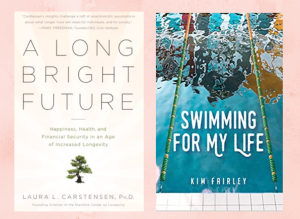
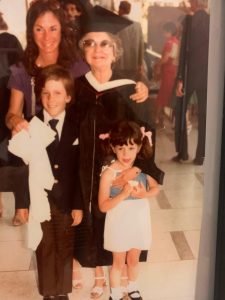
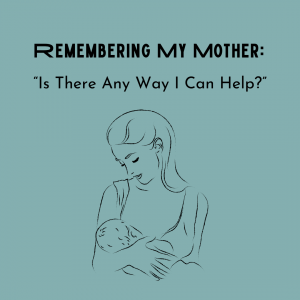 Join me last Friday morning. I’m sitting in the early morning sunlight, looking out at the evergreens, pondering my conversation with my friend Beth. I’ve spent 20 minutes listening to her challenges caring for her ornery, mean-spirited ninety-five-year-old mother. Although my mother had not been mean-spirited, our relationship had been complex. Although it had been a decade since I’d lost my mother, my friend Beth’s pain had triggered my difficulties watching my ninety-three-year-old mother lose her battle with Parkinson’s and dementia.
Join me last Friday morning. I’m sitting in the early morning sunlight, looking out at the evergreens, pondering my conversation with my friend Beth. I’ve spent 20 minutes listening to her challenges caring for her ornery, mean-spirited ninety-five-year-old mother. Although my mother had not been mean-spirited, our relationship had been complex. Although it had been a decade since I’d lost my mother, my friend Beth’s pain had triggered my difficulties watching my ninety-three-year-old mother lose her battle with Parkinson’s and dementia. 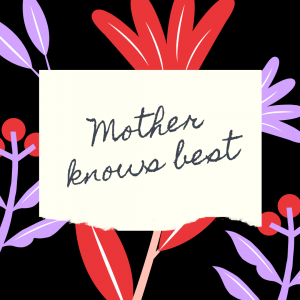 After I finished writing The Girl in the Red Boots: Making Peace with My Mother, I was urged to write a
After I finished writing The Girl in the Red Boots: Making Peace with My Mother, I was urged to write a 



